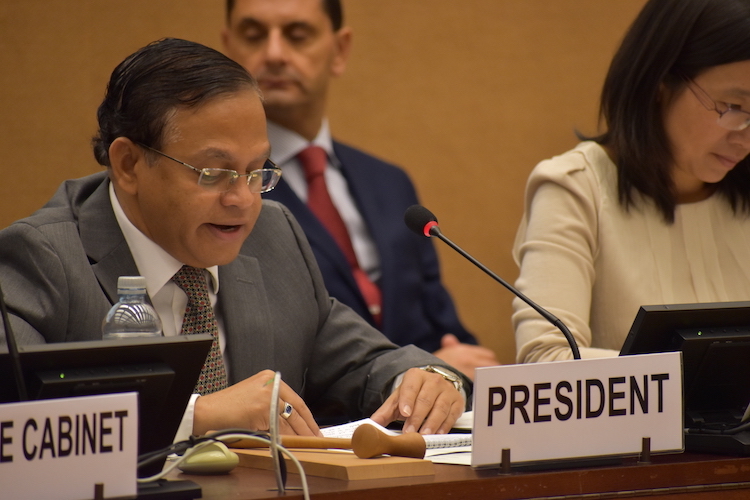By Jamshed Baruah
GENEVA (IDN) – “We need to look at how best multilateralism can be advanced and strengthened rather than at theories that suggest a ‘doomsday’ scenario or the ‘dawn of an era of post-multilateralism’,” said Ambassador A.L.A. Azeez, Permanent Representative of Sri Lanka to United Nations in Geneva.
He was addressing the 10th session of the Trade and Development Commission of the United Nations Conference on Trade and Development (UNCTAD) following his election by acclamation as its Chairperson.
“UNCTAD is an innovative platform where both theories and practices are analysed and pathways and options identified, to help guide nations in their search for solutions to trade and development constraints and challenges,” he added.
The five-day annual session that concluded on November 16, 2018 – adopting a set of Agreed Conclusions for its future focus, at a time when the multilateral trading system is under increasing strain – provided an opportunity for member States and other stakeholders to discuss “key trade and development issues related to building more resilient, sustainable and inclusive development”.
The Commission had gathered amid growing concerns about the multilateral trading system’s future and prospects for achieving the goals enshrined in the 2030 Agenda for Sustainable Development endorsed by global leaders in 2015.
A number of international and regional groups including the Group of 77, the European Union, JUSCANZ (Japan, US, Canada and New Zealand Group), and the African Union contributed to the Commission’s deliberations.
“We cannot afford to let worries over international trade put the 2030 Agenda at risk,” UNCTAD Secretary-General Mukhisa Kituyi said in a written statement to the commission. “At UNCTAD, we will continue to do all we can to help countries put trade to work for their development, even as global prospects appear uncertain,” Dr. Kituyi added.
Canada’s deputy permanent representative to the World Trade Organization (WTO), John O’Neill, said the title of the Commission’s opening day discussion – Multilateralism under threat: what next? – would have seemed extreme a few years ago. “But today we are indeed facing unprecedented challenges in the multilateral trading system,” O’Neill said. “We need to take urgent action.”
He added: “The rules that were established through the multilateral trading system matter a great deal to all of us at all levels of development. They afford protection and create opportunities for even the smallest economies to compete and to succeed.”
Pamela Coke-Hamilton, director of UNCTAD’s international trade and commodities division, agreed trade is in a “very fragile state” and that current trade tensions jeopardize development goals. “I think the threat to the Sustainable Development Goals is clear,” Coke-Hamilton said.
“But what is even more important is that UNCTAD estimates suggest that a full trade war would take average tariff levels from 3% to 30%,”” she said, adding that a such a hike would be catastrophic, especially for developing countries.
Shamika N. Sirimanne, director of UNCTAD’s division on technology and logistics, agreed with her colleague, reminding governments that trade costs in developing countries are already 1.8 times higher than in developed economies. “This is on average. But the costs can be vastly different. If you’re a least developed country, the trade costs are much higher than this,” Sirimanne said.
So, how do we revitalize the multilateral trading system under current tensions, asked Cheryl Spencer, Jamaica’s permanent representative to the UN in Geneva, and called for restraint. “Any escalation [in trade tensions] will undoubtedly have destabilizing effect on global trade and economic growth.”
But, she said, restraint must be followed by dialogue. And the United Kingdom’s permanent representative to the UN in Geneva, Julian Braithwaite, agreed. “One of the big issues has been the fact that often the perspective of developed and developing countries seem to be different or sometimes even at odds,” Ambassador Braithwaite said.
He added: “UNCTAD has actually played a very important role in ensuring that the perspective of developing countries is properly reflected in multilateral discussions and has been a sort of key platform for that for five decades.”
China’s permanent representative to the World Trade Organization, Zhang Xiangchen, said that rebuilding trust in the multilateral system required placing developing countries’ perspectives at the heart of discussions on how to reform organizations such as the WTO.
“The development dimension has always been at the core of the organization…as the vast majority of WTO members are developing countries,” Ambassador Xiangchen said. “I’m convinced that the capacity constraint of developing countries is the fundamental aspect of development issues at the WTO.”
The capacity gap between developed and developing countries, he said, includes aspects such as their ability to negotiate trade rules, to implement the agreements and to benefit from the negotiated outcomes.
“Sri Lanka and other developing countries consider the work of UNCTAD critically important for capacity building and other forms of technical assistance in all areas of trade interest,” which are impacting the achievement of Sustainable Development Goals” by 2030, Ambassador Azeez told IDN. [IDN-InDepthNews – 25 November 2018]
Photo: Ambassador Azeez, Sri Lanka’s Permanent Representative to the UN in Geneva. Credit: Sri Lanka Permanent Mission.
IDN is flagship agency of the International Press Syndicate.
facebook.com/IDN.GoingDeeper – twitter.com/InDepthNews

